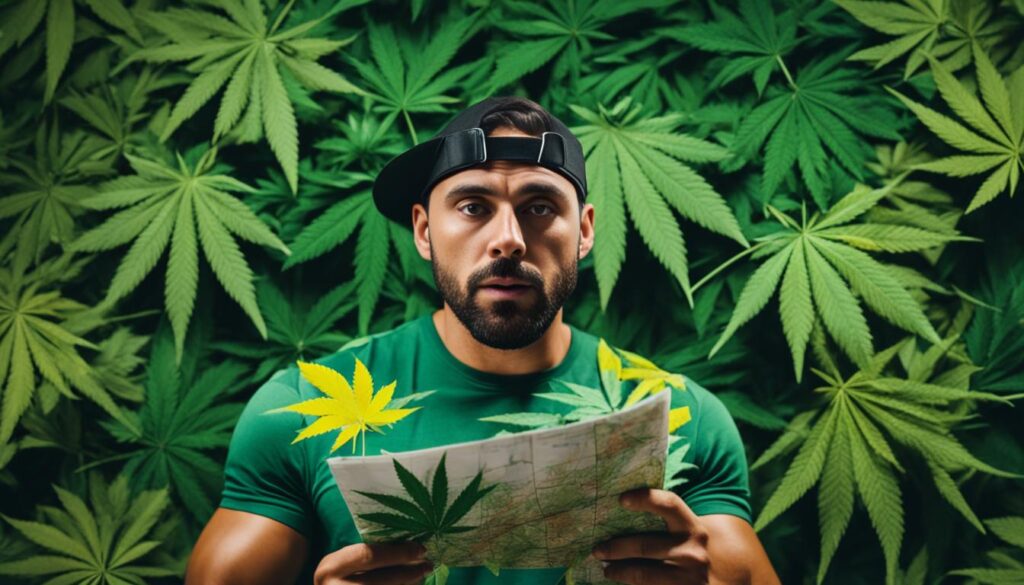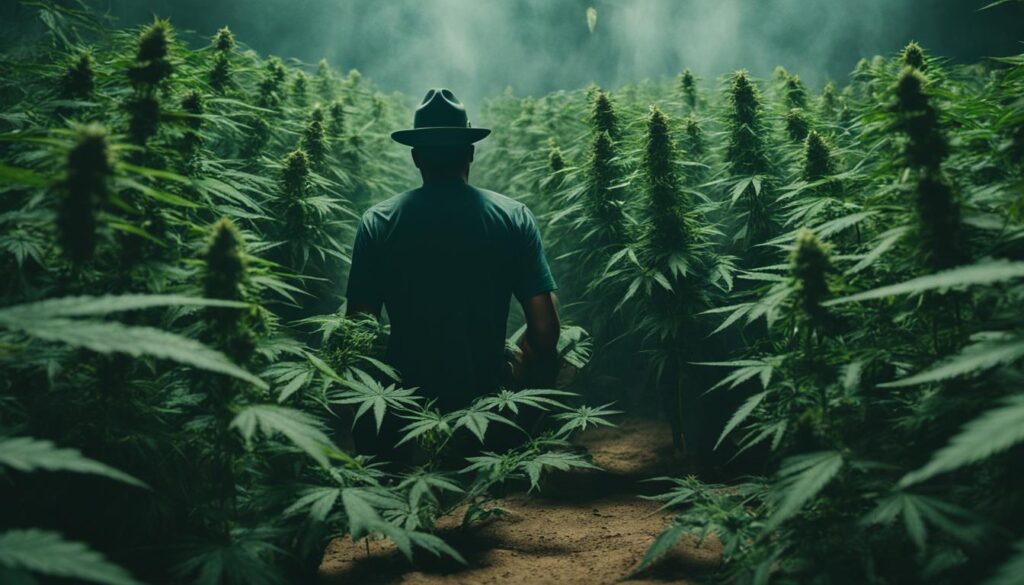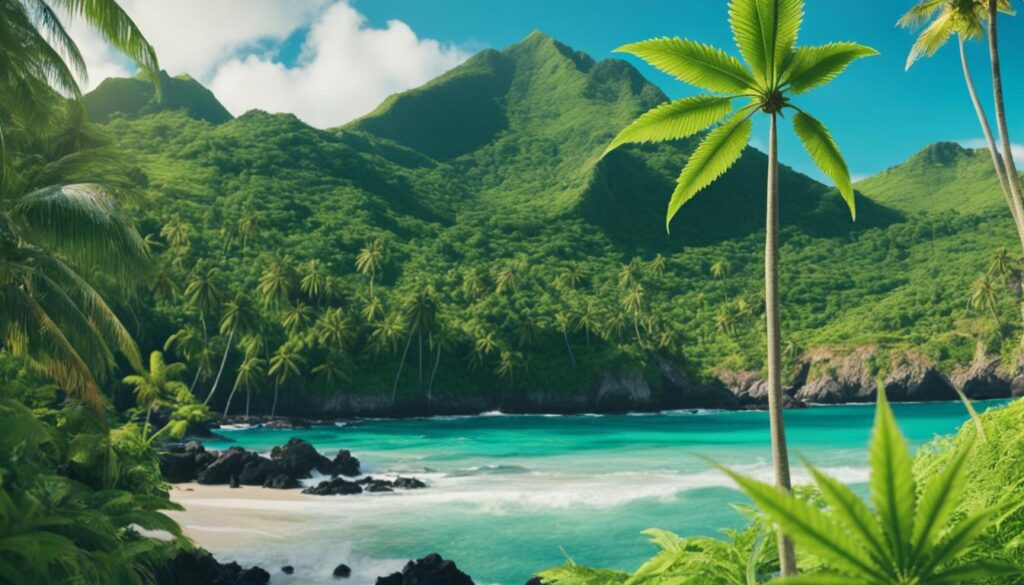
Understanding the Legality of Weed in Punta Cana for Tourists

If you are planning a trip to Punta Cana, you may be wondering about the legality of weed in this popular tourist destination. It’s important to know the rules and regulations regarding cannabis before your visit to avoid any legal issues.
The Dominican Republic, including Punta Cana, has strict laws when it comes to cannabis. Both the possession and use of marijuana, whether for medical or recreational purposes, are prohibited in the country. The law applies to locals and tourists alike, so it’s crucial to abide by these regulations during your stay.
Any amount of marijuana possession is considered a punishable offense in Punta Cana. The penalties for cannabis-related offenses can range from fines to imprisonment, depending on the quantity of drugs found in possession. It’s essential to be aware of these laws and avoid any involvement with cannabis to ensure a safe and enjoyable trip.
Key Takeaways:
- Punta Cana has strict laws regarding cannabis, and both possession and use are prohibited.
- The possession of any quantity of marijuana is considered a punishable offense, with penalties ranging from fines to imprisonment.
- Tourists should familiarize themselves with the laws and regulations surrounding cannabis to avoid legal consequences.
- There are severe penalties for cannabis possession in Punta Cana, depending on the quantity of marijuana found in possession.
- Visitors to Punta Cana should explore alternative activities and attractions that do not involve cannabis to ensure an enjoyable visit.
Cannabis Laws in the Dominican Republic
In the Dominican Republic, cannabis is fully illegal, including in Punta Cana. The country has implemented Law 50-88, which addresses narcotics and their possession. Under this law, the possession of any quantity of cannabis is considered a punishable offense. Offenders are categorized based on the quantity of drugs found in their possession, with penalties varying depending on the category. Punta Cana follows the national drug policy, and visitors should adhere to these regulations to avoid legal issues.
Punishments for Cannabis Possession in Punta Cana

The penalties for cannabis possession in Punta Cana can have serious legal consequences. The severity of the punishment depends on the amount of marijuana found in possession. Under the current legislation, the offenses are categorized as follows:
| Category | Quantity | Minimum Sentence | Maximum Sentence | Minimum Fine | Maximum Fine |
|---|---|---|---|---|---|
| Category one | 20 grams or less | 6 months in prison | 2 years in prison | RD$1,500 | RD$2,500 |
| Category two | 20 grams to one pound | 3 years in prison | 10 years in prison | RD$10,000 | RD$50,000 |
| Category three | More than one pound | 5 years in prison | 20 years in prison | RD$50,000 | N/A |
It’s important to note that these punishments apply to individuals caught with cannabis for personal use. Traffickers or those found with large quantities of cannabis may face even more severe penalties.
The strict enforcement of cannabis laws in Punta Cana emphasizes the seriousness of the possession offenses. As a tourist, it’s crucial to avoid any involvement with marijuana to prevent legal troubles and enjoy a safe visit to this beautiful destination.
Recent Cannabis Policy Changes in the Caribbean

While many countries in the Caribbean have been considering or implementing cannabis policy reforms, the Dominican Republic has not made any significant changes regarding the legality of cannabis. However, it’s worth noting that neighboring countries like Jamaica and Puerto Rico have made strides in cannabis policy by decriminalizing or legalizing medical marijuana or even recreational use in certain circumstances. It’s essential for tourists to remember that laws can vary significantly from country to country and should always familiarize themselves with the specific regulations of the destination they are visiting.
Cannabis Policy in Caribbean Countries
Jamaica
Jamaica has decriminalized the possession of small quantities of cannabis and permits the use of medical marijuana. Possession of up to two ounces is considered a petty offense and incurs a small fine. Additionally, Jamaica has established a licensing authority for legal cultivation, processing, and distribution of cannabis for medical and scientific purposes.
Puerto Rico
Puerto Rico has legalized both medical and recreational marijuana. Qualified patients can obtain medical marijuana by obtaining a recommendation from a registered healthcare provider. For recreational use, adults aged 21 and over are allowed to possess and consume up to one ounce of cannabis.
These examples demonstrate the varying approaches and changing attitudes towards cannabis in the Caribbean region.
| Country | Cannabis Policy |
|---|---|
| Jamaica | Decriminalized possession of small quantities. Legal for medical use. |
| Puerto Rico | Legal for both medical and recreational use. |
As shown in the table, Jamaica has decriminalized small-scale possession of cannabis, while Puerto Rico has taken a further step by legalizing both medical and recreational use. These policy changes highlight the evolving perspectives on cannabis in the Caribbean.
Proposed Prohibition on Cannabis-related Music and Clothing in the Dominican Republic
Recent developments in the Dominican Republic have brought attention to the proposal of a new law that aims to further restrict cannabis-related content. If passed, this law would prohibit the use of cannabis-related music, publications, propaganda, and programs that contain messages encouraging the consumption and illegal trafficking of drugs and controlled substances, including cannabis.
The proposed law seeks to amend Article 36 of Dominican Republic Law 50-88 on Drugs and Controlled Substances, expanding the existing prohibition to include sanctions. This potential prohibition raises concerns about freedom of expression and could have implications for the selective enforcement of these regulations.
"The proposed prohibition raises concerns about freedom of expression and the potential for selective enforcement."
In recent years, the Dominican Republic has been actively enforcing strict cannabis laws, and this proposed prohibition further emphasizes their stance on cannabis-related activities. While the intention behind this proposal may be to discourage drug consumption and trafficking, the potential impact on personal expression and artistic freedom has sparked debates.
Impact on Music and Clothing
If implemented, this proposed prohibition would have significant implications for the music industry and clothing brands in the Dominican Republic. Artists, musicians, and performers who incorporate cannabis themes or references in their music could face restrictions on their creative expressions.
Similarly, clothing brands that design and produce cannabis-related apparel may no longer be able to openly market and sell their products. This restriction could impact the local economy by limiting job opportunities and potentially stifling the growth of businesses in the cannabis-related fashion industry.
It is important to note that this proposed prohibition is still under consideration, and its ultimate fate remains uncertain. However, it highlights the ongoing debate surrounding cannabis policies in the Dominican Republic and the potential challenges faced by those involved in the music and fashion industries.
The Image of Cannabis
One of the underlying concerns driving this proposed prohibition is the worry that cannabis-related content may contribute to the normalization or glamorization of drug use. By restricting cannabis-related music and clothing, policymakers aim to control the image and perception of cannabis, deterring its use and promoting a drug-free culture.
"By restricting cannabis-related music and clothing, policymakers aim to control the image and perception of cannabis, deterring its use and promoting a drug-free culture."
Potential Implications
If this proposed prohibition becomes law, it could have wide-ranging repercussions for creative artists, musicians, clothing brands, and the local cannabis industry. Some of the potential implications include:
- Limitation of artistic expression and creative freedom
- Challenges for cannabis-related music events
- Restrictions on the sale and promotion of cannabis-themed clothing
- Negative impact on the local economy and job market
The potential consequences of this proposed prohibition raise questions about the balance between public safety, artistic freedom, and personal expression. The ongoing discussions surrounding this issue will shape the future of cannabis-related content in the Dominican Republic.
Summary of Proposed Prohibition on Cannabis-related Music and Clothing
| Proposed Prohibition Elements | Implications |
|---|---|
| Prohibition of cannabis-related music | Limitation of artistic expression and restrictions on music events |
| Prohibition of cannabis-related publications and propaganda | Impact on the dissemination of cannabis-related information and advocacy |
| Prohibition of cannabis-related programs | Limitation of cannabis-related content in the media and entertainment industry |
| Expansion of sanctions for violations | Potential legal consequences for offenders |
Impact of Cannabis Prohibition in Punta Cana
The strict cannabis prohibition in Punta Cana and the Dominican Republic has had far-reaching consequences for both residents and tourists. The implementation of this policy fosters a climate of fear, posing potential legal repercussions for individuals involved in cannabis-related activities. Furthermore, it restricts the potential economic opportunities that could arise from a regulated cannabis market, including job creation and tax revenue generation.
While proponents of cannabis prohibition argue that it promotes public safety and curbs drug-related criminal activities, others advocate for a more comprehensive and nuanced approach to drug policy. This approach would include harm reduction strategies and a thorough examination of the potential benefits associated with cannabis legalization.
The impact of the cannabis prohibition in Punta Cana extends beyond the legal sphere. It permeates social dynamics and influences the overall perception of the destination. The strict policy may deter tourists who are seeking destinations with more lenient cannabis laws, leading to potential revenue losses for the tourism industry.
"The current cannabis prohibition in Punta Cana not only hinders personal freedoms but also restrains the economic potential of a regulated cannabis market. A more comprehensive and evidence-based approach would allow for the exploration of harm reduction strategies and the realization of the benefits that could be derived from cannabis legalization."
In order to strike a balance between public safety and personal freedoms, it is essential to reevaluate the current cannabis policy in Punta Cana. This reevaluation should be informed by an understanding of the social, economic, and health-related implications of cannabis prohibition.
By adopting a more progressive and flexible approach, Punta Cana has the opportunity to address the concerns surrounding the cannabis prohibition and explore alternative drug policies that prioritize harm reduction and evidence-based decision making.
Consequences of Cannabis Prohibition in Punta Cana
The consequences of cannabis prohibition in Punta Cana are multi-faceted and have wide-ranging effects:
- The creation of a black market: The prohibition of cannabis gives rise to an unregulated and underground market, which can perpetuate organized crime and related social issues.
- Unequal enforcement: Strict prohibition can disproportionately affect marginalized communities, leading to social inequalities and injustices.
- Missed economic opportunities: A regulated cannabis market has the potential to generate significant economic growth, including job creation and tax revenue. However, these opportunities are lost due to the prohibition.
- Public health considerations: Cannabis prohibition may hinder access to medical marijuana for patients who could benefit from its therapeutic properties.
These consequences highlight the need for a comprehensive review of the cannabis policy in Punta Cana and the Dominican Republic, taking into account the social, economic, and health-related impacts of the prohibition.
Related Articles:
- Understanding Cannabis Laws in Punta Cana
- Exploring Alternatives to Cannabis in Punta Cana
- The Future of Cannabis Policy in the Dominican Republic
Traveling to Punta Cana and Cannabis Use
Travelers to Punta Cana should be aware that cannabis use, possession, and distribution are strictly prohibited in the Dominican Republic. It is essential to respect local laws and regulations to avoid legal consequences and protect personal safety.
Those who violate the cannabis laws may face fines, imprisonment, and potential complications with reentry to the country. It is advisable to refrain from using or carrying cannabis while in Punta Cana to ensure a safe and enjoyable visit.
Exploring the beautiful beaches, indulging in water sports, and enjoying the vibrant nightlife are just a few of the many activities that Punta Cana has to offer. By immersing yourself in the local culture and experiencing the wide range of attractions available, you can have an unforgettable time in Punta Cana.
Alternatives to Cannabis in Punta Cana
While cannabis may be off-limits in Punta Cana, there are plenty of other activities and attractions to enjoy during your visit. Punta Cana is renowned for its diverse range of options that cater to all tastes and preferences. Whether you’re seeking adventure, relaxation, or cultural experiences, Punta Cana has something for everyone.
Here are some of the top alternatives to cannabis in Punta Cana:
- Explore the Stunning Beaches: Punta Cana boasts some of the most breathtaking beaches in the Caribbean. Spend your days soaking up the sun, swimming in the crystal-clear waters, or partaking in thrilling water sports like snorkeling, scuba diving, and jet skiing.
- Indulge in Exciting Water Sports: Punta Cana offers an array of water sports activities for adrenaline junkies. Try your hand at parasailing, kiteboarding, paddleboarding, or deep-sea fishing for an unforgettable experience.
- Tee Off at World-Class Golf Courses: Golf enthusiasts will be delighted by Punta Cana’s championship golf courses. Play a round surrounded by stunning landscapes and challenging fairways designed by renowned golf architects.
- Experience the Vibrant Nightlife: Punta Cana comes alive at night with its vibrant clubs, bars, and casinos. Dance the night away to pulsating beats, enjoy live music performances, or try your luck at the casinos.
- Immerse Yourself in Local Culture: Discover the rich history and culture of the Dominican Republic by visiting the various cultural sites and museums in Punta Cana. Learn about the indigenous Taíno people, explore ancient ruins, or participate in traditional dance and music workshops.
- Savor Local Cuisine: Indulge in the mouthwatering flavors of Dominican cuisine. From fresh seafood dishes to savory meats and tropical fruits, Punta Cana offers a gastronomic adventure that will tantalize your taste buds.
- Embark on Island Excursions: Take a day trip to the nearby islands of Saona or Catalina for a picturesque escape. Explore pristine beaches, swim in turquoise waters, and snorkel to discover vibrant marine life.
- Relax and Unwind: Punta Cana is synonymous with relaxation. Pamper yourself with a spa treatment, soak in rejuvenating thermal springs, or simply lounge by the pool with a refreshing cocktail.
With so many alternatives at your fingertips, you won’t miss out on a memorable and fulfilling experience in Punta Cana without cannabis.
Conclusion
In summary, it is crucial for travelers to understand that cannabis is illegal in Punta Cana and the Dominican Republic. The possession, sale, and use of marijuana are strictly prohibited, and individuals caught violating these laws can face severe penalties. To ensure a safe and enjoyable visit, it is essential to respect local regulations and refrain from any involvement with cannabis.
By familiarizing yourself with the laws and regulations of Punta Cana, you can avoid legal issues and protect your personal safety. Instead of focusing on cannabis-related activities, there are plenty of alternative options to explore in Punta Cana. The region offers beautiful beaches, exciting water sports, golf courses, vibrant nightlife, cultural experiences, and delicious local cuisine. Embrace the many attractions and activities available to have a memorable trip.
Remember, respecting the laws and regulations of your travel destination is essential, and this includes avoiding cannabis use. By adhering to these guidelines and exploring the diverse range of experiences Punta Cana has to offer, you can have a fantastic vacation without compromising your legal status or personal well-being.
FAQ
Is weed legal in Punta Cana?
No, cannabis is illegal in Punta Cana, as well as in the Dominican Republic. The possession, sale, and use of marijuana are strictly prohibited.
What are the cannabis laws in the Dominican Republic?
The Dominican Republic follows Law 50-88, which addresses narcotics and their possession. Under this law, the possession of any quantity of cannabis is considered a punishable offense.
What are the punishments for cannabis possession in Punta Cana?
The penalties for cannabis possession in Punta Cana vary based on the amount of marijuana found in possession. Offenders are categorized into three categories, each with its own minimum and maximum sentences and fines.
Have there been any recent cannabis policy changes in the Caribbean?
While neighboring countries like Jamaica and Puerto Rico have made progress in cannabis policy reforms, the Dominican Republic has not made any significant changes regarding the legality of cannabis.
Is there a proposed prohibition on cannabis-related music and clothing in the Dominican Republic?
Yes, there have been recent attempts in the Dominican Republic to prohibit music, publications, propaganda, or programs containing messages encouraging the consumption and illegal trafficking of drugs, including cannabis.
What is the impact of cannabis prohibition in Punta Cana?
The strict cannabis prohibition in Punta Cana and the Dominican Republic creates a climate of fear, potential legal repercussions, and limits economic opportunities that could arise from a regulated cannabis market.
Can I use cannabis while traveling to Punta Cana?
No, travelers should be aware that cannabis use, possession, and distribution are strictly prohibited in the Dominican Republic. It is important to respect local laws and regulations to avoid legal consequences.
What are the alternatives to cannabis in Punta Cana?
Punta Cana offers numerous activities and attractions, such as beautiful beaches, water sports, golf courses, cultural sites, local cuisine, excursions to nearby islands, and vibrant nightlife.
What is the conclusion regarding cannabis legality in Punta Cana?
Cannabis is illegal in Punta Cana and the Dominican Republic. It is crucial to respect local laws, avoid involvement with cannabis, and explore alternative activities and attractions for an enjoyable visit.